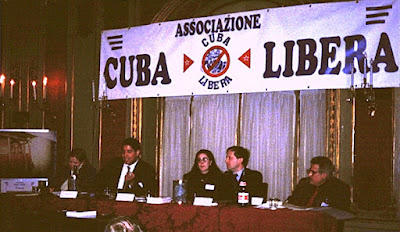Video excerpt taken from the Subcommittee: Western Hemisphere, Civilian Security, and Trade hearing held on July 11, 2019 titled Human Rights in Cuba: Beyond the Veneer of Reform.
Chairman Sires, Ranking Member Rooney and Members of the Subcommittee, thank you for this privilege to provide testimony on human rights in Cuba.
My name is John Suarez and I'm the Executive Director of the Center for a Free Cuba, a non-profit, non-partisan organization dedicated to the promotion of human rights in Cuba.
Past is prologue
To understand the human rights situation in Cuba, one must understand what came before. Cuba had regular competitive elections, and between 1944 and 1952 presidents who respected human rights and civil liberties. This was reflected in the role Cuban diplomats played in 1948 in pushing for regional and international human rights covenants. All of this came crashing down with Fulgencio Batista’s military coup in 1952.
The Castro brothers promised to restore democracy, while imposing a communist dictatorship in 1959.
In May 1961 they confiscated private schools and most seminaries to eliminate religion. In September 1961, the Castro regime at gun point collected 131 priests, brothers and a bishop, placing them on board the Spanish ship Covadonga and deported them from Cuba.
Today, the Office of Religious Affairs (ORA), an arm of the Central Committee of the Cuban Communist Party, still oversees religious affairs in Cuba, and exists to monitor, hinder and restrict religious activities.
Sixty years later, Fidel Castro is gone, but his brother Raul remains along with the communist regime.
The non-transition
What is called reform in Cuba has been a fraud for the dynastic succession of the Castro family. Raul Castro remains in control of the government as head of the Communist Party. His son, Alejandro Castro Espín, a colonel in the Ministry of the Interior presided over the Cuban side in the secret negotiations to normalize relations during the previous Administration.
In 2018 Raul Castro presided over the revision of the current constitution that was subjected to a referendum on February 24, 2019.
On February 24th Cubans were called to the polls to ratify a new constitution that despite cosmetic changes, enshrines the principles of the existing one-party political system. Basic conditions for free and fair elections were not fulfilled, independent observers were not allowed, and numerous voting irregularities were reported.
This is the third time during the communist era that the constitution was changed.
The Communist Party remains the only legal political party. The maximum authority in the regime resides with the head of the Cuban Communist Party.
The late dissident leader Oswaldo Payá Sardiñas called this fraudulent change. There have been no improvements that alter the nature of the Cuban regime. It is a one-party communist dictatorship run by the Castros.
Repression surrounding the Constitutional Reform
Opposition groups in Cuba are not legally recognized, and independent civil society is actively discouraged. Independent human rights organizations in Cuba are illegal. There is no space for free expression in Cuba.
The Cuban government attempted to create a fake space for debate on the constitutional referendum, but when independent actors attempted to speak in them freely, the response was swift and brutal.
New laws place further restrictions on Cuban artists and bloggers
Over the past sixteen months two decrees have further undermined and restricted human rights. Decree 349 signed by President Díaz-Canel in 2018 further restricts and controls artistic expression in Cuba. This provoked protests by independent artists. Many were arbitrarily detained, and at least two have been jailed for a prolonged period.
Decree 68 issued on July 4, 2019 "prohibits Cuban citizens from running websites hosted outside of the country."
Despite repression some Cubans remains defiant.
Cubans continue to defy the dictatorship and demand their rights and freedoms often paying a terrible cost. With us today is Sirley Avila Leon.
Sirley was a delegate to the Municipal Assembly of People’s Power in Cuba for seven years when the regime eliminated her district. She had fought to reopen a school in her district but been ignored by official channels and had reached out to international media. Her son, Yoerlis Peña Ávila, who had an 18-year distinguished career in the Cuban military was forced out when he refused to declare his mother insane and have her committed.
Sirley joined the dissident movement and repression against her increased. On May 24, 2015 she was the victim of a machete attack carried out by Osmany Carriòn that led to the loss of her left hand, right upper arm nearly severed, and knees slashed into. Following the attack, she did not receive adequate care and was told quietly by medical doctors that if she wanted to get better, she would need to leave Cuba.
This is not new. Cubans sought freedom by fleeing the island while others have protested for their rights over decades. The response has often been brutal. 25 years ago, on July 13, 1994 regime agents killed 37 Cubans when they tried to flee to freedom aboard the “13 de marzo” tugboat. Less than a month later August 5, 1994 the streets of Havana erupted with thousands of protesters chanting “libertad” were repressed.
Real change must be centered on human rights improvements
Cuban dissident Oswaldo Payá on March 30, 2012 warned about the Cuban government’s effort to perpetuate itself in power. He also knew what real change would look like and argued that [t]he gradual approach only makes sense if there are transparent prospects of freedom and rights.” Oswaldo also reminded many who have forgotten that: “We Cubans have a right to our rights.” Human rights in the Cuban struggle for freedom are not an afterthought, but the central issue in the dispute between Cubans and the dictatorship.
Thank you very much.
Full hearing is available online.





